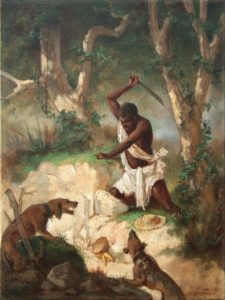 “KIKIRIBÚ MANDINGA” Y OTRAS FRASES USADAS EN CUBA.
“KIKIRIBÚ MANDINGA” Y OTRAS FRASES USADAS EN CUBA.
Esta nota interesante sobre frases famosas usadas en Cuba no se deben a una intrincada comunidad llamada ‘Mandinga’ que implica ascender más de 30 kilómetros desde el municipio de Baracoa, por una carretera empedrada y estrecha que dificulta el tránsito. Es entre sus pobladores una leyenda de que su nombre se debe a la práctica de la hechicería que caracterizaba esos contornos años atrás, otros dicen que el apodo de “tierra o casa del diablo” fue dado por su lejanía de la ciudad de Baracoa.
Pero la expresión “Kikiribú Mandinga”, que hasta forma parte de una canción popular, nos llega de cuando la Tomada de La Habana por los ingleses, acción militar en agosto de 1762, durante la denominada Guerra de los Siete Años.
Mandinga – se denominaban los esclavos de la tribu «mandingo», esclavos traídos a América en los siglos XVI y XVII. y cuya tribu se halla en la región occidental de Sudán. «El que no tiene dinga, tiene mandinga» – esta expresión se alude al mestizaje del pueblo cubano. «Llevarse a uno mandinga» – se usaba para atemorizar a los niños, mandinga en este caso significa «el diablo» y equivale a «llevarse a uno el diablo o mala suerte. Se emplea como el eufemismo.
En este período fue cuando más se incrementó la trata de la esclavitud y los barcos venían cargados de esclavos africanos que la mayoría perecían en la travesía producto principalmente de las epidemias y los malos tratos.
Por esa época también los ingleses solían llamar a todos los negros por mandinga, que eran los provenientes de la cuenca del Congo, y cada vez que uno moría el capitán del barco ordenaba: Kit his butt mandinga
Que era lo mismo que decir: denle una patada a ese mandinga para que lo tiraran al mar, por eso se asoció en Cuba kikiribú con la muerte y como otras historias y leyendas afrocubanas pasó de generación en generación.
 “KIKIRIBÚ MANDINGA” AND OTHER PHRASES USED IN CUBA.
“KIKIRIBÚ MANDINGA” AND OTHER PHRASES USED IN CUBA.
This interesting note about famous phrases used in Cuba is not due to an intricate community called ‘Mandinga’ which implies climbing more than 30 kilometers from the municipality of Baracoa, by a narrow, cobbled road that makes transit difficult. It is among its inhabitants a legend that its name is due to the practice of sorcery that characterized those contours years ago, others say that the nickname of “land or house of the devil” was given by its remoteness from the city of Baracoa.
But the expression “Kikiribú Mandinga” , which is even part of a popular song, comes to us from when the Tomada de La Habana was taken by the English, action military in August of 1762, during the so-called Seven Years’ War.
Mandinga – were called the slaves of the tribe “Mandingo”, slaves brought to America in the sixteenth and seventeenth centuries. and whose tribe is in the western region of Sudan. «He who does not have dinga, has mandinga» – this expression refers to the miscegenation of the Cuban people. “Take a Mandinga” – was used to frighten children, mandinga in this case means “the devil” and is equivalent to “take one the devil or bad luck. It is used as the euphemism.
In this period was when the slave trade increased the most and the ships came loaded with African slaves that most perished in the crossing, mainly caused by epidemics and mistreatment.

At that time, the English used to call all the blacks for mandinga, which were those from the Congo basin, and every time one died the captain of the ship ordered: Kit his butt mandinga
That was the same as saying: give that Mandingo a kick to be thrown into the sea, that’s why Cuba was associated with kikiribú death and like other Afro-Cuban stories and legends passed down from generation to generation.
Agencies/ Arrajatabla/ Alberto Denys/ Internet Photos/ Arnoldo Varona/ www.TheCubanHistory.com
THE CUBAN HISTORY, HOLLYWOOD.




